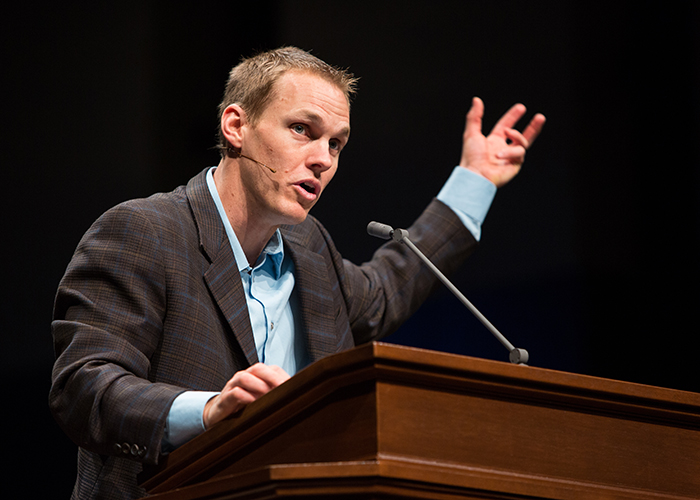Platt encourages passion for global spread of God’s glory

“Passion for the nations is the essence of what it means to have the heart of Christ in you,” said International Mission Board President David Platt during his chapel sermon at Southwestern Seminary, March 1. Preaching from Romans 15-16, Platt called all students, faculty and staff to be driven by an “all-consuming passion and vision” for the glory of God to be made known throughout the nations.
Platt explained that this passion and vision should be marked by four characteristics. The first characteristic is that it should be biblically grounded. Drawing attention to Romans 15:9-12, wherein Paul quotes several Old Testament passages regarding the salvation of the Gentiles, Platt explained that Paul’s passion for God’s glory among all the nations was rooted in his understanding of Scripture.
Platt noted that the end of missions in many churches is a result of the “curse of pragmatism that has plagued the American church.” The church has looked to culture for its starting point in missions rather than to Scripture, but it is a biblical foundation, not personal methodology, that will drive action to spread the Gospel.
As the church is biblically grounded in its vision for missions, the church must also have spiritual dependence upon Jesus Christ. Platt proceeded to show from Romans 15:15-16 that Paul is completely dependent upon Christ for his life and ministry. Platt asked, “Don’t we all want to get to the end of our lives and ministry and look back and be able to say, ‘Only Christ could have done that’?”
One of the greatest hindrances to the spread of the Gospel, Platt continued, is the self-sufficient mindset of the church. He urged Christians to seek God and cry out to Him in desperation, because God has “called us to a task we cannot complete without the fullness of His presence.”
The third characteristic Platt said must mark Christians is missiological urgency—that is, having a “collective Paul-like ambition to see Christ preached where He has not been named.” Even with more than 6,000 unreached people groups and 2.8 billion unreached people, Platt said the church has lost much of its urgency to take the Gospel to those who do not have access to it.
In light of this apathy amongst many Christians, Platt pointed out that it is the role of church leaders to “fuel a missiologically urgent passion for God’s global glory in every local church” and to help the church see the need for the Gospel to be preached among the nations. He added, “God has invited you and me to be a part of making the greatest news in the world known all over the planet.”
The final characteristic of the vision for the nations is for it to be “ecclesiologically involved.” In other words, the entire church must share in the passion of preaching the Gospel among the nations. “God is calling His church to participate in global missions in a variety of different ways,” Platt said, including church planting, mission trips, and financial support of missionaries.
Platt concluded that, even as students are unsure of what the future may hold, they must be ready to go and ready to serve however God chooses. Regarding their future ministries, Platt’s encouragement to students is that they “would realize each of us has a unique part to play in the spread of God’s glory among the nations.”



